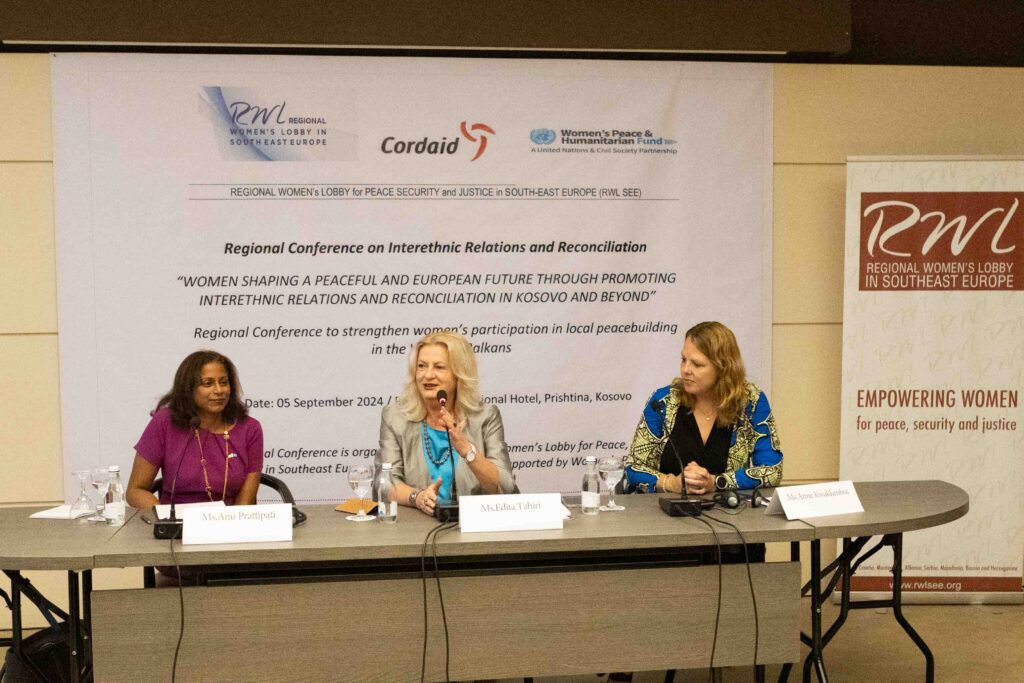For decades, women in the Western Balkans have been sidelined in formal peace negotiations. Yet, they foster peace in their communities, resolve disputes, and pave the way for reconciliation. Women leaders from Kosovo, Serbia, and the broader region demand equal representation in the peace process. Their message is clear: It’s time for women to take their rightful place at the table.

‘Wars break out. Peace is built slowly, often by women whose efforts are unnoticed. Let’s invite men to build peace with us,’ says Gordana Čomić, former Member of Parliament in Serbia.
Like many other women in the Western Balkans’ political and civil society space, she raises a concern: Women have long been excluded from formal peace negotiations between Kosovo and Serbia. With women absent from the negotiation tables, the “boys’ club” diplomacy has accomplished almost nothing and only led to rising tensions in the region.
Open Dialogue to Advance Peace and Reconciliation
In response, women leaders from the region have come together to engage in open dialogue to advance peace and reconciliation. The Regional Women’s Lobby in South East Europe (RWLSEE) and Cordaid organised these efforts with the support of the Rapid Response Window of the United Nations Women’s Peace Humanitarian Fund (WPHF).
As this project ends and its recommendations and best practices are shared, it is a moment to reflect on the two key events that brought women leaders together.
The first conference, Women Build Lasting Peace in the Western Balkans: Defrosting the Stalled Brussels Dialogue Between Kosovo and Serbia on Normalisation of Relations, focused on restarting official peacebuilding efforts with women’s active participation.
The second event, Women Shaping a Peaceful Future Through Promoting Interethnic Relations and Reconciliation in Kosovo and the Entire Post-Conflict Region of the Western Balkans, was held in Pristina, Kosovo, and focused on promoting interethnic relations and reconciliation.
These conferences provided platforms for women to share post-war experiences and address shared challenges. They facilitated a difficult but necessary dialogue: How can we move towards peace while acknowledging the painful past that remains vivid in the memory of many?
‘If they don’t give you a seat at the table, bring a folding chair.’
The Failure of Male-Dominated Politics
Official, male-dominated meetings have failed to achieve any substantial progress. Politicians in the Balkans seem more focused on keeping the past alive, seeing agreement as a sign of weakness. Now, the region is stuck in a cycle of unresolved conflict and tension. This is very different from when Edita Tahiri, a chair of the RLWSEE, was leading the official peace negotiations.
From 2011 to 2017, she was Kosovo’s Chief Negotiator at the EU-facilitated Dialogue on normalising neighbourly relations between Kosovo and Serbia. During this time, she signed the first-ever agreement between Pristina and Belgrade after 20 years of peace talks.
Participants shared a common frustration: ‘She successfully brokered agreements by using her power to create solutions, not dominate others. Despite demonstrating the effectiveness of women peacebuilders, she remains the only female peace negotiator in the Balkans involved in international peace processes.’
The women agreed not to wait for an invitation but to take collective action to shape female politics. ‘If they don’t give you a seat at the table, bring a folding chair,’ echoed the famous words of Shirley Chisholm, the first black woman to be elected to the United States Congress. ‘The UN Security Council Resolution 1325 was adopted almost a quarter of a century ago, but the level of women’s participation in mediation processes continues to be very low,’ says Edita. ‘Jointly, we need to change this reality.’
Quotas for Women in Peacebuilding
Women are already at the forefront of mediating conflicts in their communities, resolving day-to-day disputes and fostering peace at the grassroots level. This work is crucial, as it directly impacts people’s lives in Kosovo, Serbia, and the wider region.
However, women must also be recognised as legitimate powers in formal negotiations and granted the same respect and influence as their male counterparts. Women leaders argued for laws mandating 50% female representation quotas among peace delegations.
‘The barriers created by patriarchy in the Balkans make quotas necessary,’ agreed participants. ‘Men need to understand that nothing can be discussed anymore without women. Quotas for women in parliament do work – it’s time to demand that half of the official delegations be women.’ Fifty per cent is a natural proportion, after all.
Women United
Facilitating and supporting programmes like this is crucial because they allow women from different regions to come together, share experiences, and realise that they are not alone in male-dominated politics. Together, they are powerful agents of change capable of shaping a peaceful and equitable future for the Western Balkans.